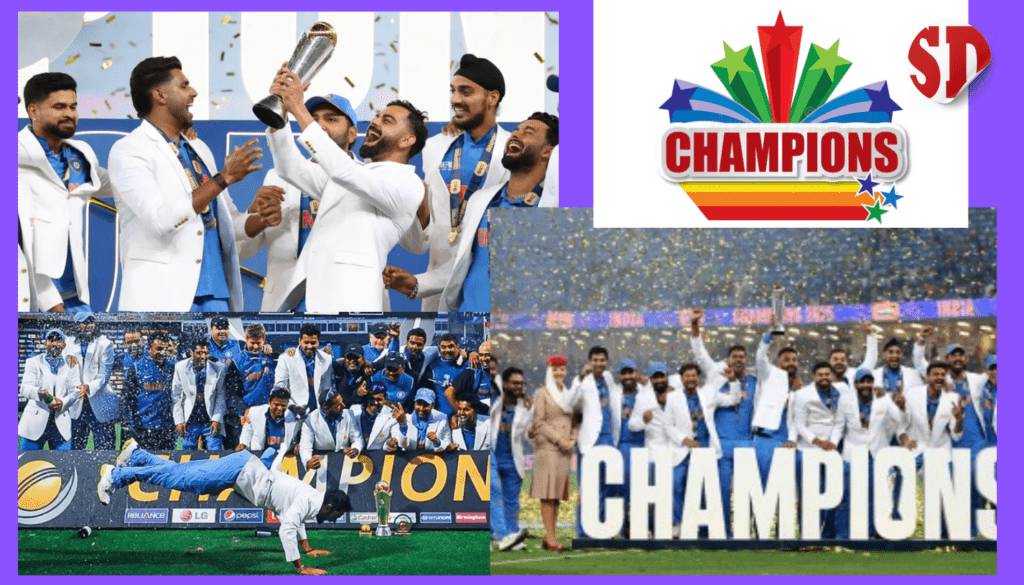
India’s Unbeaten Champions Trophy Triumph: In the annals of cricket history, certain victories stand out not just for the silverware but for the stories they tell of grit, resilience, and unyielding spirit. India’s recent Champions Trophy win in Dubai is one such tale.
Playing five and winning five, India showcased dominance, adaptability, and an unwavering belief in their squad’s depth, especially in the absence of their pace spearhead, Jasprit Bumrah.
Table of Contents
The Road to Glory: India’s Unblemished Campaign
1. Dominant Group Stage Performances
India’s journey began with a series of commanding performances in the group stages. Each match was a testament to their preparation and hunger for success.
- Against Bangladesh: The tournament opener saw India setting a formidable target, with Shubman Gill’s century leading the charge. The bowlers complemented the batsmen’s efforts, restricting Bangladesh to a below-par score.
- Clash with Pakistan: Always a high-octane encounter, India showcased clinical precision. Virat Kohli’s masterclass in chasing ensured a comfortable victory, solidifying India’s position at the top of the group.
2. Semifinal Showdown with Australia
Facing Australia in the semifinals, India encountered their toughest challenge yet. Australia posted a competitive total of 264, but India’s batting depth shone through. Contributions from the middle order ensured a smooth chase, propelling India to the final.
Overcoming Adversity: The Bumrah Factor
3. Jasprit Bumrah’s Absence
The news of Jasprit Bumrah’s back injury sent ripples through the cricketing community. A bowler of his caliber is irreplaceable, and his absence was a significant blow to India’s plans. Reports indicated that Bumrah was sidelined due to swelling in his back, requiring rehabilitation at the National Cricket Academy (NCA) in Bengaluru.
4. Bowling Unit Steps Up
In Bumrah’s absence, the onus was on the remaining bowlers to fill the void. Mohammed Shami, returning from a heel surgery, led the pace attack with vigor. Spinners Kuldeep Yadav and Varun Chakravarthy played pivotal roles, especially in the middle overs, choking the opposition’s run flow and picking crucial wickets.

Leadership and Strategy: The Rohit-Gambhir Era
5. Rohit Sharma’s Captaincy
Taking over the reins, Rohit Sharma’s leadership was marked by aggression and adaptability. His decision-making, especially in crunch situations, was instrumental in India’s success. Rohit’s selfless approach, often taking risks to provide the team with a strong start, set the tone for the tournament.
6. Gautam Gambhir’s Tactical Acumen
As part of the management, Gautam Gambhir’s insights added a strategic edge to the team’s approach. His emphasis on mental toughness and game awareness was evident in India’s on-field strategies.
Batting Brilliance: Collective Contributions
7. Top-Order Consistency
Shubman Gill’s early tournament form provided India with solid starts. His technique and temperament were lauded by critics and fans alike.
8. Middle-Order Resilience
Shreyas Iyer emerged as the unsung hero, consistently anchoring the innings during challenging phases. His partnerships with Hardik Pandya and Axar Patel were crucial in stabilizing the innings.
9. KL Rahul’s Finishing Touches
Batting at No. 6, KL Rahul embraced his role with maturity. His unbeaten knock in the final against New Zealand was a testament to his calm demeanor under pressure.
The Grand Finale: A Clash with New Zealand
10. New Zealand’s Competitive Total
In the final, New Zealand posted a total of 251, with notable contributions from Daryl Mitchell and Michael Bracewell. India’s bowlers, particularly the spinners, ensured the target remained within reach.
11. Rohit Sharma’s Match-Winning Knock
Chasing 252, Rohit Sharma led from the front with a scintillating 76. His aggressive approach in the powerplay laid the foundation for the chase.
12. Middle-Order Steadiness
Despite a few hiccups, contributions from Shreyas Iyer, Axar Patel, and a composed KL Rahul ensured India crossed the finish line with nine balls to spare.
India’s Champions Trophy triumph in Dubai is more than just a tournament victory; it’s a narrative of resilience, adaptability, and collective effort. Overcoming the setback of Jasprit Bumrah’s absence, the team showcased depth and determination.
Under the astute leadership of Rohit Sharma and the strategic insights of Gautam Gambhir, India not only remained unbeaten but also reinforced their status as a formidable force in international cricket.
Also Read: ICC Champions Trophy 2025 Tournament Announced, Know India & Other Country’s Expected Squad
What was the significance of India’s unbeaten run in the Champions Trophy?
India’s flawless performance underscored their dominance and adaptability, especially in high-pressure situations.
How did India compensate for Jasprit Bumrah’s absence?
The team relied on collective bowling efforts, with senior players like Mohammed Shami stepping up and spinners playing pivotal roles.
How many times has India won the Champions Trophy?
India has now won two ODI World Cup, two T20 World Cup and three Champions Trophy titles.
